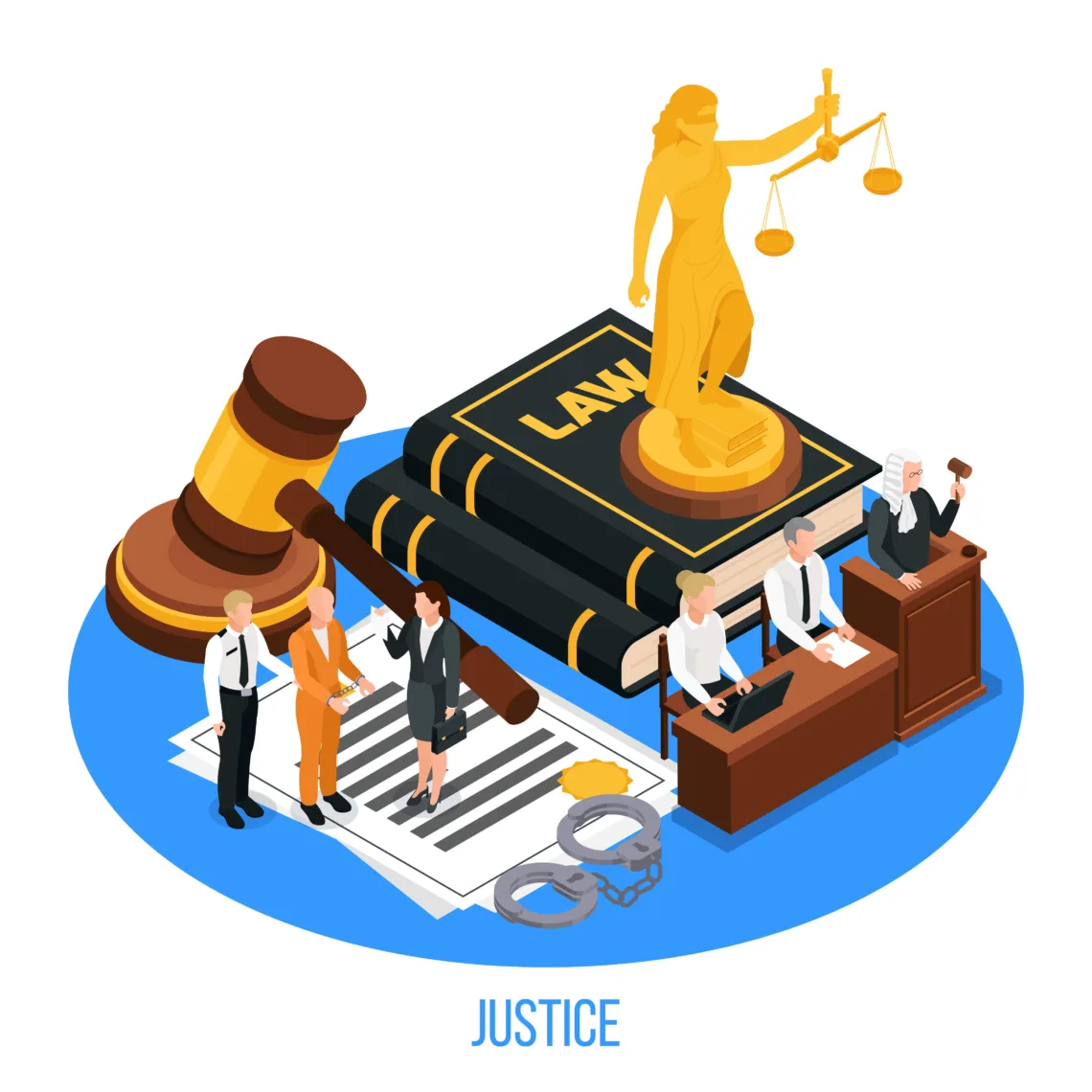
Justice Unleashed: The Mighty Authority and Positive Impact of Section 482 CrPC
Section 482 CrPC stands out as a source of strength and authority. This clause, which is deeply embedded in the Code of Criminal Procedure, gives the High Court inherent authority that goes beyond the usual and, as a result, serves as a safeguard against any abuses of the legal system. The layers of CrPC Section 482’s relevance open up as we go deeper into our analysis; what emerges is a dynamic force that defends not just the integrity of court procedures but also justice itself.
Examining the historical foundations reveals that Section 482 crpc is more than just a statute; it’s a reflection of the changing requirements of the judicial system. Its origins may be traced back to the astuteness of legislators who aimed to provide the courts with an adaptable instrument that could deal with unanticipated situations and guarantee that justice was served. As we examine Section 482 crpc more closely, we see how important it is to comprehend this historical background and how it has influenced the development of criminal law in India.
Fundamentally, Section 482 crpc is motivated by two mandates: safeguarding the goals of justice and preventing the exploitation of the legal system. Its dual nature gives it a distinct personality and allows the High Court to wisely step in. During this investigation, we will traverse the extensive reach of Section 482 crpc and see its implementation in many contexts. Section 482 crpc is a potent weapon that can be used to balance the judicial system, whether it is used to drop baseless accusations to spare people from drawn-out court cases or to correct mistakes that could result in a miscarriage of justice.
Navigating this legal terrain, we come upon the fine balance that Section 482 crpc requires. Legal precedents and precedent-setting decisions serve as a reference for the delicate art of striking a balance between guaranteeing justice and preventing misuse of the legal system. The route will be made clear by historical cases and real-world instances, which will also highlight the difficulties and practical applications that the judiciary faces when utilizing the authority granted by Section 482 crpc.
This exploration is not merely an academic exercise but an invitation to unravel the very fabric of justice encapsulated within Section 482 crpc of the Code of Criminal Procedure. Join us on this journey as we delve deep into the empowering essence of justice, discovering how Section 482 crpc stands as a resilient bastion, shaping the narrative of fairness and equity in our legal system.

Scope and Application of Section 482 crpc:
One of the key components of CrPC Section 482’s jurisprudential core is how broad its application is. This clause gives the High Court extensive inherent powers that it can use to intervene in cases at different phases of the judicial process. The main objective of its application is to ensure that justice is administered equitably and to avoid misuse of the legal system.
Preventing Abuse of Process: The ability of Section 482 crpc to stop the improper use or abuse of the legal system is one of its main features. This includes situations in which lawsuits are filed maliciously, vexatiously, or to harass someone. Equipped with innate jurisdiction, the High Court can intervene to halt said proceedings, functioning as a gatekeeper to prevent the degradation of the integrity of legal procedures.
Securing the Ends of Justice: Section 482 protects the fundamental principles of justice in addition to preventing misuse. This Article gives the High Court the authority to step in where justice is required, even when there are no clear statutory provisions in place. This dynamic feature enables the court to uphold the general principles of justice, correct mistakes, close legal loopholes, and guarantee that justice is served.
Criminal Procedures Can Be Quashed: Section 482’s ability to quash criminal proceedings is a notable application of the law. The High Court may use its inherent authority to stop legal proceedings where it is determined that the charges are without merit, are frivolous, or would be an exercise in futility. This helps the interests of justice by averting needless litigation in addition to preventing excessive harassment.
Flexible Application in Various Situations: Section 482’s application is adaptable and flexible, and it is not limited by a strict framework. The clause enables the High Court to modify its intervention in accordance with the particulars of each case. Section 482 serves as a safeguard for parties engaged, guaranteeing their fair treatment and resolving conflicting conclusions.
In essence, the scope and application of Section 482 CrPC embody a commitment to the overarching principles of justice and fairness. As we navigate through its various applications, the inherent powers vested in the High Court come to the fore, serving as a robust mechanism to maintain the delicate equilibrium between individual rights and societal interests within the realm of criminal justice.
Preventing Abuse of Process:
The power to stop the abuse of the legal system is the core of Section 482 CrPC, a potent tool against the corruption of justice. This aspect of the clause serves as an essential check and balance, allowing the High Court to monitor the legal system and make sure that it isn’t used for improper purposes.
Reducing Evil Intentions: When legal actions are brought to cause harm, one of the main uses of Section 482 crpc is evident. The provision gives the High Court the authority to intervene and stop such processes, regardless of whether they are motivated by vexatious, hidden, or personal grievances. In doing so, it preserves the judiciary’s credibility and puts an end to the abuse of the legal system.
Frustrating Litigation and Harassment: Section 482 crpc acts as a strong disincentive to harass others or drag out pointless legal disputes through vexatious litigation. To prevent the legal system from being used as a means of intimidation or coercion, the High Court has the authority to step in when it believes that certain legal actions are not legitimate. This preventative measure serves as more evidence of the idea that the legal system’s purpose is to administer justice, not to further personal grudges.
Balancing Rights and Interests: Section 482 crpc necessitates a careful juggling act to prevent procedural abuse. The court must consider the rights of all parties and determine whether the legal process is an honest attempt to bring about justice or a calculated move to place undue hardship on a particular person. This complex approach makes sure that the inherent abilities are used responsibly and in line with natural justice principles, all the while preventing abuse.
Flexibility in Application: Section 482’s preventive element is not limited by strict guidelines. It gives the High Court the freedom to modify its participation by the particulars of each case. This flexibility is necessary to handle the various forms that abuse of process might take, enabling the judiciary to keep up with new threats to the fairness of court cases.
Fundamentally, the ability to stop the misuse of the judicial system granted by Section 482 CrPC acts as a strong barrier against deceit and manipulation. By exercising this power, the High Court takes the initiative to protect the integrity of court cases, uphold the fundamental ideas of justice, and guarantee that the legal system will always be a stronghold of justice and equity.
Securing the Ends of Justice:
With the High Court’s inherent powers, CrPC Section 482 is a powerful tool that aims to safeguard justice as a higher priority while also preventing misuse. This aspect of the provision permits the judiciary to intervene outside the parameters of certain statutory provisions, demonstrating a dedication to the fundamental ideals of justice and equity.
Correcting Errors and Gaps in the Law: The court’s power to correct errors and close legal gaps is a crucial component of ensuring the objectives of justice under Section 482 CrPc. The High Court can use its inherent authority to intervene when the legal system is unable to meet a specific issue or when a mistake jeopardizes the integrity of justice, ensuring that the legal system continues to be flexible and responsive.
Dynamic Application Beyond Statutory Provisions: Section 482 provides a wider range of judicial action than provisions linked to particular statutes. Because of its innate authority, the High Court can venture into new areas where justice might be hampered by unanticipated events or shortcomings in the current legal systems. This dynamic program makes sure the court can adapt to the changing legal difficulties in an efficient manner.
Judiciary must frequently strike a balance between the technicalities of court cases and the substantive objectives of justice in order to ensure the purposes of justice are met. The High Court is empowered by Section 482 crpc to see past procedural nuances and concentrate on the core issues, administering justice by the values of justice and equity.
Adapting to Particular Circumstances: The application of Section 482 crpc is flexible and can be tailored to the particulars of each case, rather than being restricted by strict guidelines. Because of its flexibility, the High Court can effectively serve the purposes of justice in a variety of circumstances by customizing its intervention to meet the unique requirements of justice.
In essence, the securing of the ends of justice through Section 482 CrPC embodies a commitment to the overarching principles of fairness, adaptability, and responsiveness. By wielding its inherent powers, the High Court not only rectifies legal anomalies but also ensures that justice is not a mere formality but a substantive and equitable outcome. This facet of Section 482 positions the judiciary as a dynamic force in shaping the narrative of justice in the legal landscape.
Quashing of Criminal Proceedings:
A powerful tool found in the broad ambit of Section 482 CrPC is the ability to stop criminal proceedings. This aspect of the statute gives the High Court the authority to step in at its discretion when carrying on with legal processes would be pointless or unfair.
Eliminating unfounded allegations: In the context of criminal proceedings, Section 482 crpc is primarily used to suppress allegations that are deemed unfounded, frivolous, or devoid of prima facie evidence. In its capacity as a custodian of justice, the High Court has the authority to intervene where accusations against someone are without merit to spare them from drawn-out legal fights. This guarantees that harassment won’t be committed using the court system as a tool.
Preventing Unnecessary Prosecution: The High Court has the authority to stop unwarranted and unfair prosecutions under Section 482 crpc. The court may use its inherent authority to shut down criminal proceedings when it is clear that the accused will not be found guilty and when continuing the case would be pointless. This preemptive action is in line with the idea that the judicial system ought to concentrate on legitimate matters rather than acting as a channel for baseless prosecutions.
Achieving the Quashing of Criminal Proceedings under Section 482 crpc Requires a Careful Balance between Preserving Individual Rights and Ensuring the Public Interest. In determining whether to proceed with the proceedings, the court must consider the case’s merits as well as the larger interests of justice. This delicate balancing task guarantees that the inherent powers are used in a way that supports general justice standards while guarding against abuse.
Preventing Legal Injustice: One way to prevent legal injustice is by having the authority to stop criminal proceedings. The High Court may step in under Section 482 crpc if a miscarriage of justice would occur if the trial was allowed to continue. By serving as a watchful gatekeeper against potential erroneous convictions, the court guarantees that the legal system will always be a light of justice.
Essentially, the High Court’s discretionary power to step in when justice calls for it is embodied in the quashing of criminal proceedings under Section 482 CrPC. Through the use of this authority, the court shields people from needless legal disputes and preserves the integrity of the legal system, making sure that it fulfills the greater goal of justice rather than just becoming a formality.
Landmark Cases of Section 482 crpc:
Several significant cases have created and characterized the jurisprudential environment surrounding Section 482 CrPC, each adding to the complex interpretation and implementation of this crucial clause. These instances serve as cornerstones for legal interpretation, shedding light on the reach, constraints, and revolutionary possibilities of Section 482 crpc. Here are a few salient instances:
- P. Kapur v. State of Punjab (AIR 1960 SC 866):
- This seminal case laid down foundational principles regarding the inherent powers of the High Court under Section 482. It emphasized that the provision should be invoked sparingly and only in cases where interference is imperative to prevent injustice or secure the ends of justice.
- State of Haryana v. Bhajan Lal (1992 Supp (1) SCC 335):
- A landmark judgment that established a two-fold test for quashing criminal proceedings under Section 482. The court outlined specific situations, including frivolous prosecutions and the absence of a prima facie case, where the High Court could exercise its inherent powers.
- Madhu Limaye v. State of Maharashtra (AIR 1978 SC 47):
- This case clarified that Section 482 is not a carte blanche for the High Court to re-appreciate evidence or reassess the merits of a case. It underscored the importance of preserving the delicate balance between preventing abuse of process and securing justice.
- Zandu Pharmaceutical Works Ltd. v. Mohd. Sharaful Haque (2005 (1) SCC 122):
- A significant case that emphasized the need for the High Court to exercise its inherent powers under Section 482 to prevent an abuse of process in cases where allegations are made with a malicious intent to wreak vengeance on the accused.
- Pepsi Foods Ltd. v. Special Judicial Magistrate (1998 (5) SCC 749):
- This case clarified that the power under Section 482 is not to be used to circumvent the statutory procedures established for criminal trials. It highlighted the need for the court to be cautious in exercising its inherent powers and not to usurp the jurisdiction of trial courts.
The legal community has benefited greatly from these and other precedent-setting cases by receiving insightful advice on how to properly utilize the inherent powers granted by CrPC Section 482. They have influenced how this clause has been interpreted and applied, helping to ensure that it is consistent with the values of justice and equity.
Conclusion:
Wrapping the inherent powers of the High Court to avoid abuse of process and secure the ends of justice, Section 482 CrPC stands out as a beacon of resilience and empowerment amid the complex web of criminal law. The intricate structure of this provision has come to light via our investigation, underscoring its importance in preserving the precarious equilibrium between social interests and individual rights.
Section 482 CrPC, from its historical foundation to its ever-changing uses, is a monument to the changing demands of the judicial system. The preventive element, which stops the misuse of the legal system, presents the High Court as a watchful gatekeeper who protects people from pointless lawsuits and malevolent purpose. This aspect guarantees that the legal system will always be a stronghold of justice, free from conflicting interests.
At the same time, the provision’s contribution to achieving the goals of justice goes beyond simple prevention; it gives the courts the authority to correct mistakes, close legal loopholes, and adjust to particular situations. The court’s dedication to equity is demonstrated by its discretionary power to halt criminal proceedings, which protects the integrity of the legal system and spares parties from needless legal disputes.
The examination of seminal cases has yielded insightful information that has shaped the parameters of Section 482’s implementation. These judicial rulings, which range from the landmark R. P. Kapur case to the complex standards described in Bhajan Lal, have become landmarks, guaranteeing that the inherent powers be exercised responsibly while keeping a close eye on justice and equity.
As we come to the end of our exploration of CrPC Section 482’s empowering essence, we acknowledge that it is a live, breathing part of our legal system. It embodies the fortitude needed to successfully negotiate the complexities of criminal procedures as well as the empowerment required to guarantee that justice continues to be the cornerstone of our legal system. In all its forms, Section 482 bears witness to the judiciary’s dedication to preserving equity, justice, and the high standards that form its foundation.

Section 323 IPC
You May Also Like

section 130 motor vehicle act
March 14, 2024
RTI: A Beacon of Hope for Transparency and Citizen Empowerment
October 17, 2024

One Comment
Pingback: